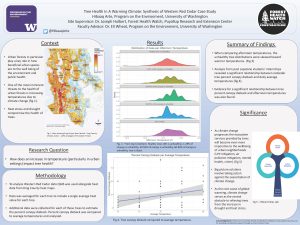Tree Health In a Warming Climate: A Synthesis of the Western Redcedar Case Study
Urban tree health is imperative to the overall functioning of the diverse ecosystem that is the urban environment. With climate change increasing in severity causing temperatures to rise, research on the impact of heat on urban trees is pivotal as we aim to keep communities and ecosystems healthy and balanced. My internship with the Forest Health Watch program focused on work performed by Dr. Joseph Hulbert, University of Washington capstone students (Angela Gaither and Lyndsay Felthoven) and community scientists on heat related impacts to the Western Red cedar. The coniferous tree is native to the Pacific Northwest and holds deep cultural ties to the state of Washington, thus making it the focus of the studies research efforts. During the study the health of 382 trees were measured within areas of King County Washington where air temperatures were estimated through a heat mapping effort (these measurements were conducted by 56 community scientists). Additionally, one-hundred and ten randomly selected street trees in Seattle and Renton were also visited to estimate the percent canopy dieback (these estimates were performed by Dr. Joseph, Angela Gaither and Lyndsay Felthoven). Distribution of temperature data were most distinct between health classes in the afternoon with the exception of trees that were dead. A positive linear relationship was noted between percent canopy dieback and average temperatures. These results indicate the benefits that communities receive from redcedar trees may be reduced by warming temperatures. Benefits such as their ability to mitigate the effects of urban heat islands, improve mental health, and even decrease urban crime rates
